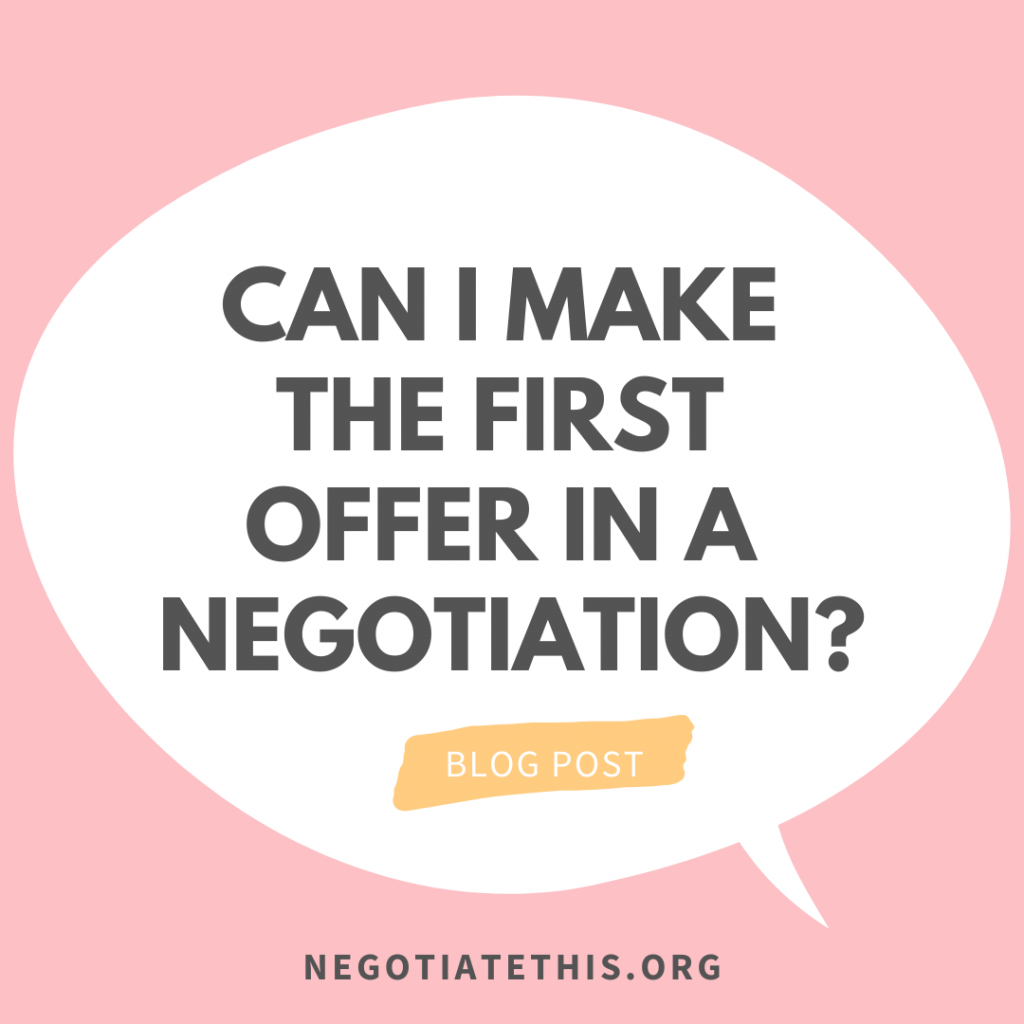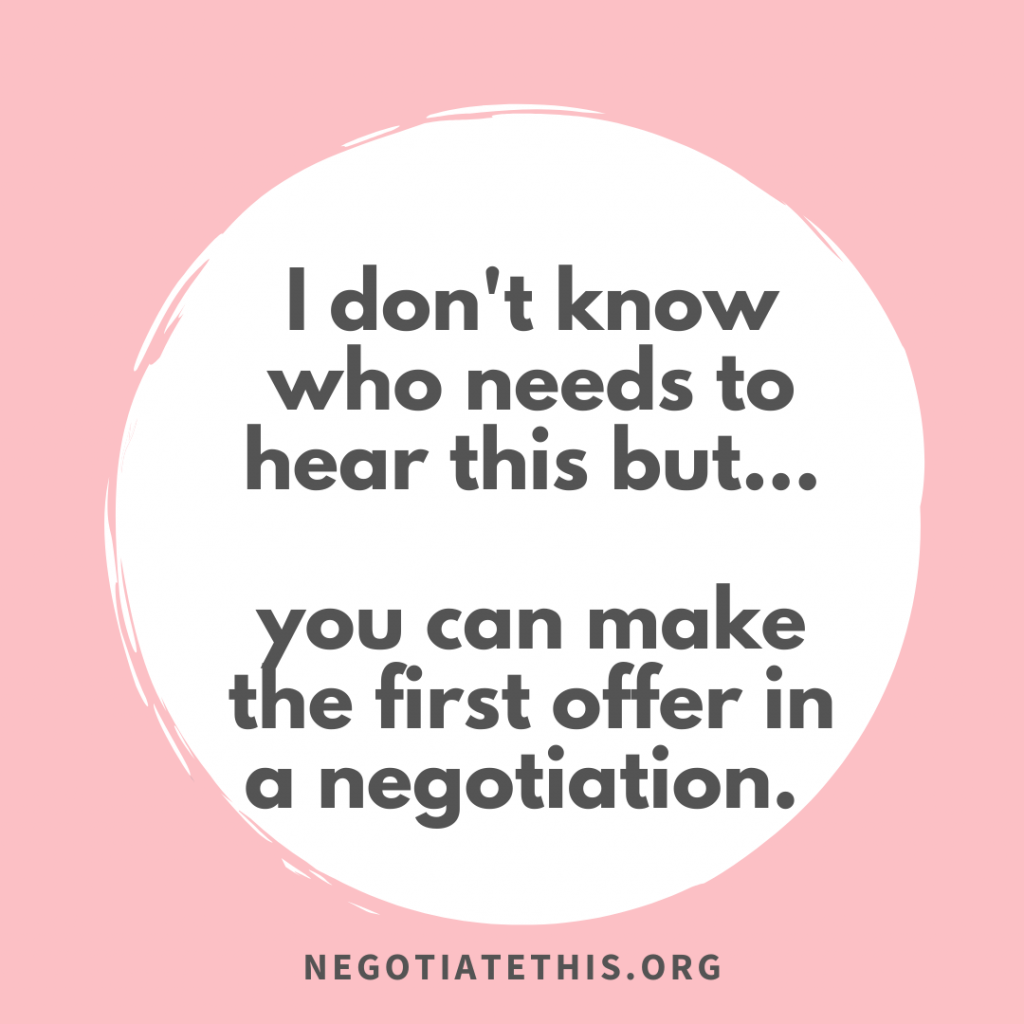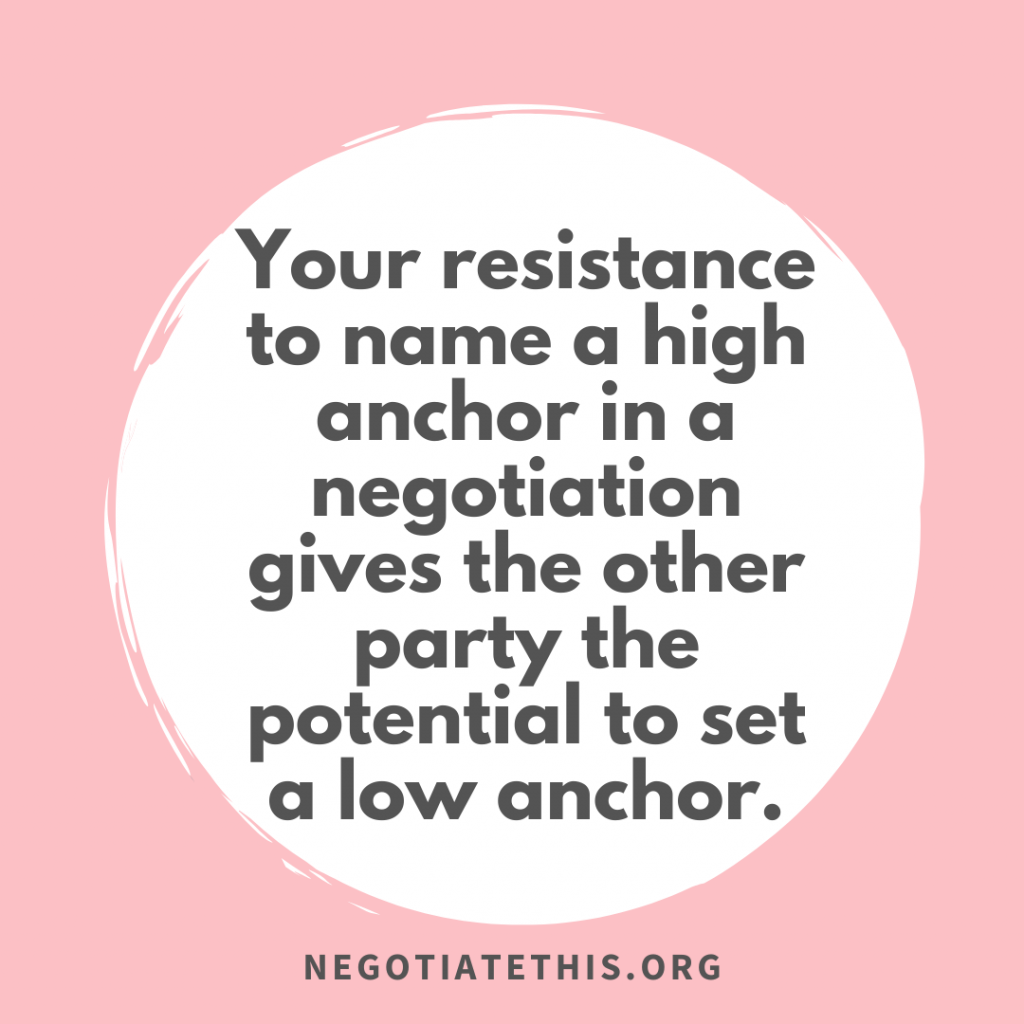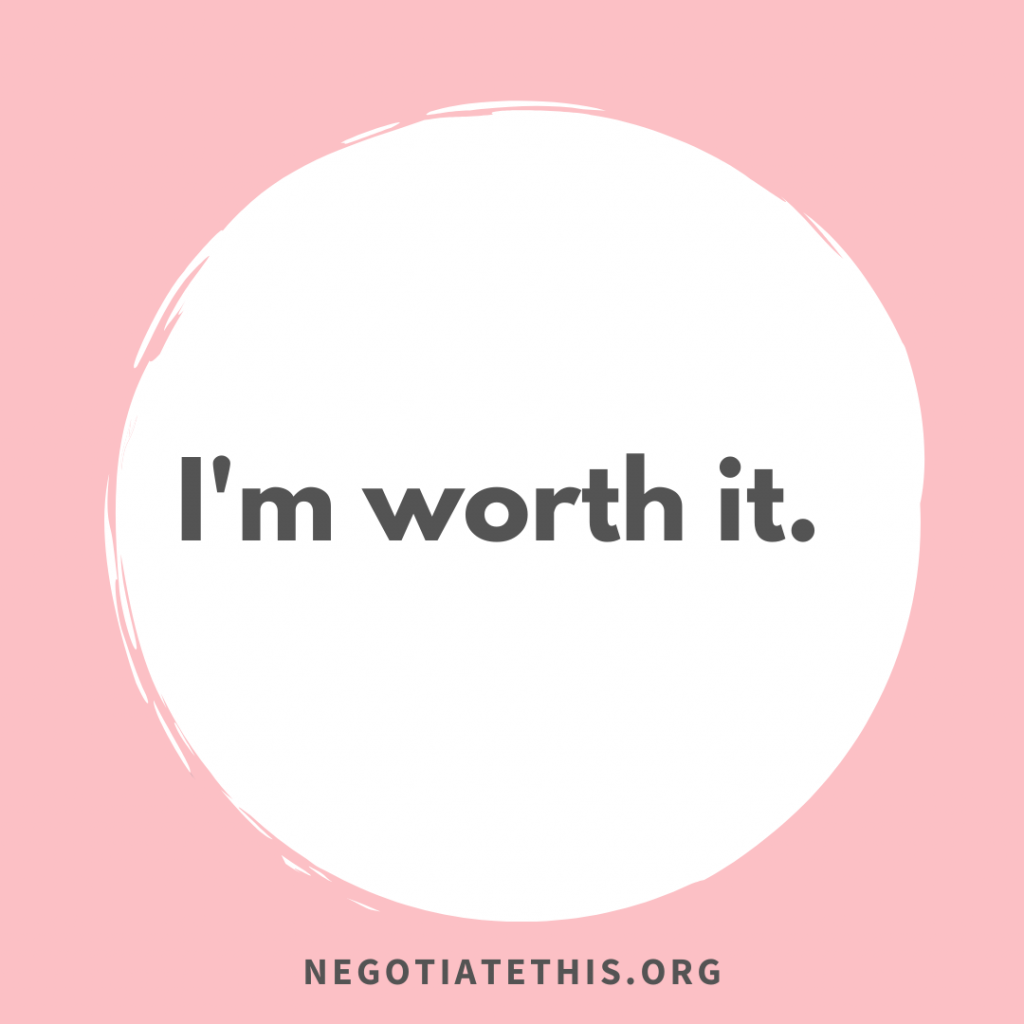Here are 4 important negotiation questions you may often wonder while preparing for a negotiation. There are so many questions and unknowns within a negotiation. Maybe you will find yourself in a negotiation and are not sure what to do. This post will help answer a few of those questions to ease your mind. Find the answers to 4 important negotiation questions to help you in your next negotiation.
Important Negotiation Questions:
- Should I make small talk?
- Should I make the first offer?
- What if a low offer is given first?
- Should I express gratitude in a negotiation?
Important Question #1: Should I Make Small Talk in a Negotiation?
The first of the important negotiation questions is whether you should make small talk in a negotiation. The answer is… it depends. Do you identify as male or female? The results for females: inconclusive and no impact. For males, it has shown it improves their negotiation outcomes. The bottom line: You do you.

If you’re like many others, you might be nervous during a negotiation. This is understandable and if making small talk calms your nerves, then go right ahead. While small talk can be a benefit for some within a negotiation, it can also have no impact. The research up to this point says that small talk is still very gendered within negotiation.
“For male negotiators, engaging in small talk consistently enhanced perceptions of liking, cooperativeness, and relationship satisfaction. Female negotiators did not enjoy a boost… men benefited from small talk by receiving a more favorable final offer” (Shaughnessy, Mislin & Hentschel, 2015). This finding may be a little enraging to some. A lot to others. The study shows that men benefit monetarily from small talk while women do not. If you want to scrap small talk, then by all means do that. If small talk calms you and helps to alleviate tension, then go for it. Do what is best for you.
Small Talk Considerations
One negotiation outlook is that it can help you learn about your negotiation partner. “Begin with small talk and you stay with small talk as long as possible because it helps you learn what your negotiation partner values. And when you know what your negotiation partner values, it’s much easier to characterize your own services or goods as delivering the value she already wants” (Pynchon, 2012).
Also, consider the context of the negotiation. Attempt to read the situation and your negotiation partner. Some factors to consider: Where does the negotiation take place? Is your negotiation collaborator inviting small talk? Read the context clues (Harvard Law, 2020). Go with the flow and also do what is true to you.

Small Talk or Not, Be Authentic in a Negotiation
Overall in a negotiation, “Be authentic” (Pynchon, 2012). Take the context into consideration and don’t force it. Negotiate to your style and what feels best for you.
*The idea of “likability” within small talk was intentionally left out. While small talk may appear to be a tool to “win” someone over in a negotiation, the end goal is not to be liked. You do not have to be “likable” in order to have a successful negotiation. This is often an overly gendered ideal that is repressive to females and those who endure systemic oppression.
Important Question #2: Should I Make the First Offer in a Negotiation?

This important negotiation question throws a lot of people off. Many people are torn on whether they should press their negotiation partner for a range or a number first. This tactic can lead to a forceful interaction instead of a smooth one. The goal is to have a smooth interaction in a negotiation whenever possible.
It is a negotiation myth that you can’t make the first offer. Your resistance to name a price may adversely impact the negotiation.

It is widely understood that the first spoken number is very influential. The first number given in a negotiation is the number in which the negotiation revolves. This is called “anchoring” in a negotiation. “Anchoring is a well-known cognitive bias… When conditions are uncertain, high anchors draw our attention to the positive qualities” (Harvard Law, 2020). On the contrary, “Low anchors draw attention to flaws” (Harvard Law, 2020). We want to make a high first offer. This allows our our negotiation collaborator to recognize and focus on the positive attributes of what is being negotiated.
First Offer Doubt – Don’t Be Fooled
Negotiations can feel tricky and you can easily believe that “you’ll gain valuable information about your opponent’s bargaining position” if they make the first offer (Galinsky, 2004). Don’t let this fool you. Letting your negotiation partner or collaborator make the first offer “makes intuitive sense, but it fails to account for the powerful effect that first offers have on the way people think about the negotiation process” (Galinsky, 2004). Don’t forget that making the first offer is powerful within a negotiation.
“Substantial psychological research suggests that, more often than not, negotiators who make first offers come out ahead” (Galinsky, 2004).
“Research on the anchoring bias has shown that negotiators may be able to gain an edge by making the first offer and anchoring the discussion in their favor. The decision of whether to make the first offer generally should be based on two factors: your knowledge of the zone of possible agreement (ZOPA) and your assessment of the other side’s knowledge of the ZOPA” (Harvard Law, 2020).
This is why the negotiation tip of doing your research can never be overstated. Do you know a lot about the numbers and range you are negotiating? This gives you an advantage. If you don’t know a lot about this, then it makes sense that you want them to name a number first because you are not sure, which happens in some negotiation scenarios. In these types of situations, it makes more sense for your negotiation collaborator to make the first offer because of too many unknown variables for you to confidently do so. The best case is to come in well equipped with research so you can make a strong first offer.
Don’t Be Afraid to Make the First Offer
You may have doubts about making the first offer. Making the first offer can leave you feeling like you potentially left money on the table, but this is not as likely as you think. “People hate to go first, if only because going first might mean missing out on an opportunity… In the real world, that rarely happens, because the other person almost always has a reasonable understanding of value” (Haden, 2016).
Remember that making the first offer can be beneficial because your resistance to name an anchor leaves the potential for the other party to set a low anchor. Overall, don’t be afraid to name the first offer. Do your research to figure out the market range and rate. Doing your due diligence in your research is key.

If you are looking for more negotiation tips, you may be interested in:
- Can I Make the First Offer in a Negotiation?
- Top 5 Negotiation Tips for a Smoother Negotiation
- Should I Negotiate Right Now? 3 Recession Resources
- 3 Powerful Negotiation Tips No One Tells You
Make the First Offer with Confidence
It can be tricky to make the first offer, but go at it with confidence. Confidence will pay off. If you’re not confident, fake it till you make it. Do your research to make a confident first offer. “Research also shows that the probability of making a first offer is related to one’s confidence and sense of control at the bargaining table” (Galinsky, 2004).
Actress Bozoma Saint John @badassboz believes in making the first offer, “Give the number first. Make it high as hell because then you can’t be low-balled … Do the work. Don’t just call a number out of the sky. Know the range and then exceed the range because then you can negotiate down just a little bit” (CBS News, 2018; Klein & Ma, 2020). Negotiate like a boss. Negotiate like Bozoma Saint John.
Important Question #3: What If a Low Offer is Given First?
This is one of the most worrisome of the important negotiation questions. What happens if your negotiation collaborator sets a low anchor first? First, assess the number. Then, work to discredit it by using your gathered research. After that, carefully introduce your own higher anchor offer (Harvard Law, 2020). “A common mistake is to respond with a counter¬offer before defusing the other side’s anchor in negotiation” (Harvard Law, 2020).
Make sure you work to discredit their low offer first in order to introduce your higher offer with credibility. “After defusing the anchor, move quickly to your counter proposal, with the caveat that mentioning the anchor explicitly and repeatedly might validate it. Then, when making a counteroffer, be sure to explain why it is fair and justifiable” (Harvard Law, 2020). At this point, you have done your research so you can accurately illustrate why their offer is not appropriate and why yours makes more sense.
Be Prepared
This is a tricky negotiation situation, though it is not one that you cannot get out of with the proper tactics. Take your time. You don’t need to respond to their offer right away. Think about the offer and then make a mental list of why it can be discredited. Make sure you give specific examples of why the amount given is not appropriate. Be polite, yet forward. Direct, yet ready to move on to a new, improved agreement where the price point is more accurately assessed.
Important Negotiation Question #4: Should I Express Gratitude?

Do negotiation and gratitude mix? While gratitude can greatly help social interactions as well as personal wellbeing, it may take the backseat during negotiations. Through multiple studies, it is found that gratitude can serve as a weakness within a negotiation. It may take away a competitive advantage that those demonstrating a neutral demeanor can sustain (Yip, Lee, Chan, Brooks, 2018).
Research has found that, “Expressing gratitude can be costly in competitive interactions: people infer that grateful counterparts are forgiving and, therefore, they are more likely to exploit their counterparts for selfish gain” (Yip, Lee, Chan, Brooks, 2018).

Gratitude is Great… Outside of a Negotiation
While being grateful is great, think twice before bringing it into your negotiation. Be neutral in your negotiation. Remember that in a negotiation, you are representing that you give more value than you receive from the company or transaction. That’s what makes you worth your asking price. Save your gratitude for your mentor or a close colleague who has helped you. And don’t forget to be grateful to the #1 person who got you to where you are in the first place: yourself. You earned whatever you asked for, so show some gratitude to yourself.

All of this is not to say that a sincere “thank you” doesn’t go a long way in the workplace, it does (Harvard Law School, 2020). Just not at the negotiating table. Make sure you show gratitude before you get there. That way those you will be negotiating with already know you value them. If you are negotiating with the people you work with every day, you will want them to know they are valued beforehand. Make sure to show personnel you work with regularly your gratefulness and appreciation before you get to the negotiation table.
If you want to show gratitude in the negotiation, thank them for their time. In this way, you are thanking them not for what they have given in monetary or other negotiation items, but for the time they have given attention to the matter and you. This is best given at the end when the negotiation has been agreed upon.

4 Important Negotiation Questions
Now you have more insight into 4 important negotiation questions so you will be more prepared in your next negotiation:
- Should I make small talk?
- Should I make the first offer?
- What if a low offer is given first?
- Should I express gratitude in a negotiation?
Do you have more negotiation questions? Do you have more insight into the questions that have been answered? Drop it in the comments below. More negotiation questions are coming in upcoming posts! Make sure you are signed up to get notified!
Looking for More on Negotiation?
If you are looking for more on negotiation, you may be interested in:
- Top 5 Negotiation Tips for a Smoother Negotiation
- 3 Powerful Negotiation Tips No One Tells You
- Can I Make the First Offer in a Negotiation?
- 3 Easy Steps to Promote Yourself in a Negotiation
- Should I Negotiate Right Now? 3 Recession Resources
Looking for Negotiation Inspiration?
Negotiation motivation can help you feel confident for your next negotiation. If you want weekly motivation and negotiation tips, sign up for blog posts and for daily inspiration follow @negotiatethis on Instagram. You got this. All you need is a little negotiation inspiration!

Sources
- Article: “Does Small Talk in Negotiation Offer Big Gains? If you’re looking to offer big gains, then don’t discount the power of small talk in negotiation” (2020) @harvardlaw
Author: Pon Staff
- Article: “More Secrets of Super Negotiators: The Power of Small Talk” (2012) @forbes
Author: Victoria Pynchon
- Article: “Should He Chitchat? The Benefits of Small Talk for Male Versus Female Negotiators” (2015) Basic & Applied Social Psychology
Author: Shaughnessy, B. A., Mislin, A. A., & Hentschel, T.
- Article: “11 Ways to Negotiate Better With Anyone (Especially If You Hate to Negotiate)”
Author: Jeff Haden, 2016 @incmagazine
- Article: “What is anchoring in negotiation? Learn how to defuse the anchoring bias and make smart first offers” (2020) @harvardlaw
Author: Katie Shonk
- Article: “When to Make the First Offer in Negotiations” (2004) @harvardhbs, Harvard Business School
Author: Adam D. Galinsky
More Sources
- Article: “How to Negotiate Salary After a Job Offer: 6 Tips to Get More Money” @thecut
Author: Alison Green (2019)
- Article: “25 Famous Women on How to Negotiate Salary” (2020) @thecut
Author: Charlotte Klein, Julie Ma
Quoted: Bozoma Saint John @badassboz, Global Chief Marketing Officer at Netflix
- Article: “Does Small Talk in Negotiation Offer Big Gains? If you’re looking to offer big gains, then don’t discount the power of small talk in negotiation” (2020) @harvardlaw
Author: Pon Staff
- Article: “Thanks for Nothing: Expressing Gratitude Invites Exploitation by Competitors”, Harvard Business School (2018) @hbs *working paper – draft form
Authors: Jeremy A. Yip, Ph.D., Kelly Kiyeon Lee, Ph.D., Cindy Chan, Ph.D., and Alison Wood Brooks, Ph.D.
- Article: “The Power of a Simple Thank You in Negotiation: How a simple who of thanks can inspire future cooperation in negotiation” (2020), Program on Negotiation, Harvard Law School
Authors: Pon Staff
- Article: “Dear Negotiation Coach: Before Saying Thank You, Think of the Context” (2017), Program on Negotiation, Harvard Law School
Authors: Pon Staff
Disclaimer: While the contents of this post and blog come from research and personal experience, each experience, situation and/or person has their own unique circumstances. This is not negotiation, financial or any other form of legitimate or official advice from an expert. Each individual should do their own independent, comprehensive research. Negotiation, career and all other decisions are the sole responsibility of each individual or party. Details found on the blog and in individual posts are opinions and should be treated as such for entertainment purposes only. Read further disclaimer information in the footer and on the Disclaimer page.
